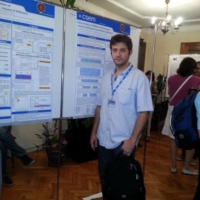Early detection and accurate diagnosis of skin cancer is very important for a good prognosis and appropriate treatment. Current standard diagnosis is based on a biopsy and histopathologic examination, an invasive method which depends on the doctor’s experience for its accuracy, and causes some discomfort to the patient.
With support from COST, electrical engineer Nikola Vukovic is focusing on developing optical imaging methodologies to better diagnose a variety of skin conditions. The optical methods offer real advantages – they are cheaper, non-invasive, portable, and can provide quick feedback. Non-invasive imaging technologies are particularly useful for skin disease diagnostic and monitoring, including skin cancer detection.
Nikola Vukovic
Since he started working towards his PhD in applied physics in 2014, Nikola has collaborated on the COST Action ‘European Network for Skin Cancer Detection using Laser Imaging’. As well as enhancing interaction and research activities in the field of optical biosensing, the network aimed to develop new laser optical methods in the mid-infra-red and terahertz part of the spectrum, to complement existing non-invasive skin-screening, such as dermoscopy, confocal microscopy and hyperspectral imaging.
Nikola was also active as a trainee in several training sessions and workshops for young researchers organised by the network. “Based on these results and the international research collaborations which followed, I am not only completing my PhD thesis successfully, but I have also recently gained an academic position as a teaching assistant at the School of Electrical Engineering in the University of Belgrade,” he explains, enabling him to continue his research in his native country.
Teaming up
During the COST Action, strong collaborations developed, especially between Nikola’s group at the University of Belgrade, Serbia, and the Action partner group headed by Dr Dmitri Boiko at the Swiss Center for Electronics and Microtechnology (CSEM), in Switzerland.
Nikola explains: “Twice in 2015 and once in 2017, I spent a month at CSEM where Dr Boiko was my host. My research work required 10 to 15 meetings in person during the month, so the visits were highly valuable.”
The dividends are evident in the several research papers Nikola has published jointly with Dr Boiko in leading peer-reviewed international journals. In addition, Nikola was involved in a successful international joint grant application by three of the COST Action’s partners, for the Fast IQ project which was awarded funding from the Swiss National Science Foundation.
Overcoming obstacles
Nikola has collaborated with Professor Dragan Indjin, Chair of the Action, and has met many new colleagues during the workshops and training sessions in a network which continues to inspire his work.
“My main motivation is to have a sense that I am making some progress, however small, on a daily basis towards my current goal, that I have learned a new interesting thing or that I have overcome an obstacle which seemed huge at the beginning,” concludes Nikola.

